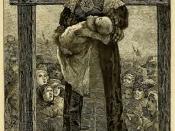Hester Prynne admonishes Pearl not to "always talk in the marketplace of what happens in the forest." (Hawthorne 206) Hester's words capture the essence of Puritan life- the vast stretches of the mind skirting the edges of common existence. Hawthorne's juxtaposition of the marketplace and the secret woods illustrates the incredible difference between the Hester presented to the world and Hester as she knows herself.
The "mystery of the primeval forest" (Hawthorne, 192) represents the "moral wilderness" (Hawthorne, 192) Hester wanders. The forest's "shadowy uncertainty" (Howells, 278) paints the fears, doubts and passions present in Hester Prynne. Yet she masks these with indifference and her good works; they remain unseen by those who dwell in the marketplace. The community rejects her initially because of her sin; she retreats to the edge of the village into the forest. Her remoteness physically and spiritually widens the gulf between her and her peers.
The Puritan's conception of the forest as a "dark and gloomy place" (Kaul 18) reflects their "confined and joyless view of life."(Kaul 19) Yet their animosity with the "lawless forest" (Kaul 19) is understandable- the town "is situated precariously between the sea and the great wilderness." Accordingly, the villagers must constantly struggle with the earth to stave off being taken over. Their religion perches as precariously between other schools of thought, therefore they view independent thought and digression from the norm as extremely detrimental to the furthering Puritanism. Thus Hester's unrepentant deviance from social dictum makes her a formidable foe to Puritanism.
But Hester scorns to beg their pardon. This "outcast and pariah" (Bloom 22) becomes the "only sinner...who manages to remain unrepentant"(Gale 355), even in the face of harsh misuse and cruelty from her peers. She scoffs at the stern and frowning god of the Puritans- she stands unbending and unrepentant before him. Yet in the forest, in the secret place, she throws herself at the feet of her God: the frail and hypocritical Dimmesdale, her partner in crime. She begs him to forgive her of her betrayal in neglecting to tell him that his constant companion, his physician, is her husband. Dimmesdale reels from the shock but forgives Hester forthrightly. In the forest, Dimmesdale forgives as a god; in Boston he suffers the torture of unforgiven sins.
Hester and Dimmesdale plot out a plan of action in the wood. Hester proposes they plunge onward to the seclusion of "the boundless forest." (Hawthorne, 207) If that proves too taxing, the "broad pathway of the sea" to Europe offers anonymity for the small family. Dimmesdale acquiesces and submits to the "hidden, subversive and disobedient parts of himself" (Bewley 313) which has repressed so long.
In the forest, Hester finds solace from the scrutiny of the village, she feels free. Hester's hair symbolizes her latent sexuality, but when they plan to leave together she lets is down in cascades about her shoulders. For the first time, the sun does not run and hide; the light embraces and transfigures her. Hester removes the bondage of the "ignominious letter" (Hawthorne, 69) and casts it away, as she cast away society so many years ago. Dimmesdale witnesses her transformation and she captivates the minister again.
Yet Hester's freedom ravels and disintegrates with Pearl's steadfast refusal to come near her transfigured mother. Pearl associates the letter with Hester, to her mind the letter and Hester are one. She apes her mother's letter, and demands to know whether she, herself, will wear one when she grows to womanhood. Pearl's letterless, passionate mother in the woods does not resemble the "Able" woman of Boston town. She refuses to come nigh.
Furthermore, Pearl "is a kind of variant to the scarlet letter, an embodiment of Hester's sin." (Baym, 92) Pearl returns to her mother to find her incredibly altered and with another person to admit to their tight family circle. She does not see any place for her with the new Hester. Pearl refuses to cross over to them until Hester dons her letter again. She would have had to take up its yoke again to return to town, though temporarily.
The very openness, the wide-open light of the marketplace dispels all passion, darkness and shadow. The staunchly prosaic, save Mistress Hibbins, can exist in the marketplace. Outside of the rigid Puritan society, in the forest, Dimmesdale and Hester allow themselves to be together, to love one another. Such as that would be outside the law, outside the common experience.
Hibbins lives outside the law as well. Outrageous rumors circulate about her- she is a witch, she has a compact with the Black Man. At that time in Massachusetts, a compact with the Black Man meant that you submitted your soul to devil, and signed his contract in blood. Any who were odd or did not fit the typical Puritanical mold were whispered about as having met the Black Man in the woods to sign his book. Such rumors fly about in regards to Hester, so much that her own daughter hears of it. Hester tells her daughter that she did meet the black man, one night, and only once. She refers to Dimmesdale as the Black Man, as their sin.
But in the marketplace one must keep up outward appearances. As long as Hester obeys the letter of the law and wears a garment of piety, she is free to commit whatever inward sin she desires. As she lives a sham, she senses the same lifestyle in others. The letter, her life as an outcast, sharpens her discernment. Her intuition reverberates with the sense that all are fallen, all sin, even the most respectable old dame who saunters through the marketplace, reviling the evil in all she sees.
Hester and Pearl stand and watch the hypocritical minister lead the procession through the marketplace on Election Day, Hester warns her child to "Hold thy peace, dear little Pearl" (Hawthorne 252). Their family exists only outside the sphere of the Puritan repression. Meanwhile, Dimmesdale masquerades under a cloak of piety. So complete is his hypocrisy that even Hester doubts her own sense of reality. As she questions whether there exists "a real bond betwixt the clergyman and herself" (Hawthorne 252), the light of conventions dims her remembrance of their time together.
Dimmesdale's inaccessibility on Election Day, his aloofness, and his "worldly position" estranges them, serves as a stark contrast to the loving understanding they had of one another in the wood. Hester can not even get close enough to hear him deliver his speech, yet she can hear the sound of his voice, his lovely "eloquent voice." (Hawthorne 260) It murmurs over and around her, carrying the feeling of his words, if not the clear and distinct words. This echoes the "quiet, soothing, but melancholy" (Hawthorne, 195) brook that meandered through the woods near Hester and Dimmesdale's meeting place.
Hester Prynne refuses to sell her soul in the marketplace of human existence; she lives within her forest- a hermit cast from humanity.








